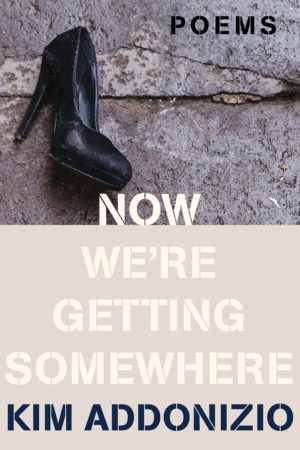Now We’re Getting Somewhere
by Kim Addonizio
reviewed by Adam Scheffler
In Now We’re Getting Somewhere’s “witty unhinged verses,” Kim Addonizio tells you outrageous truths about the world and the human heart. These poems will make you sit up straight and guffaw darkly—they will devastate you, and yet leave you feeling less alone. These poems skip the “small talk” and “get straight to the rabid dog at hand,” but they also offer you “a place to lie down & cry” and promise you that “joy is coming.” Anyone who thinks poetry is boring, or life is boring, should be prescribed this book by their doctor.
Kim Addonizio is the author of thirteen previous books of poetry, fiction, and nonfiction, and was a finalist for the National Book Award. But her work is its own best introduction. Here, in its entirety, is a brief homage to Dorothy Parker, entitled “Résumé, which gives you a sense right away of Addonizio’s edgy truth-telling:
Families shame you;
Rehab’s a scam;
Lovers drain you
And don’t give a damn.
Friends are distracted;
Aging stinks;
You’ll soon be subtracted;
You might as well drink.
Thankfully, this is not how life always goes, but it is how it goes more often than we’d like to admit. And the poem tells the truth about how we really feel when depressed, ashamed, heartbroken. Yet the wit and fun here—of someone eloquently and pithily telling you the bad news while giving you unhealthy, delicious advice—allows you to laugh your way out of this funk. It provides great relief in a sentimental culture that’s constantly slipping us unhelpful bromides, insisting that they’re what’s real.
Addonizio’s poems trust us to hear bad news, as they puncture one sentimentality after another in a way that’s wildly pleasurable and addictive. In “Animals,” she pushes back against Whitman by saying, “O Walt you were wrong, they aren’t placid or self-contained / I just watched a spoonbill make carpaccio out of a frog …” In “Death and Memory,” she punctures clichés about how loved ones live on in us, writing that her dead parents are silent and “just linger underground / in a smaller & smaller font.” It feels good to have someone committed to telling you the truth no matter how ugly it is, and Addonizio keeps these poems from falling into nihilism, through her commitment to toughing it out and being honest, but also through her arresting images (smaller & smaller font) and inventive absurdities (carpaccio).
But in addition to telling you ugly truths, Addonizio also tells you what it’s like to remain open-hearted in such a world, and thus to have a heart that’s “like a target,” “like the last Red Wolf / in the decimated population of eastern North Carolina / looking for a mate.” She doesn’t trust the heart, and her poems are full of self-skepticism, and unbowdlerized presentations of the absurd extremes of our messy desires. Yet she’s fully committed to following the heart down back alleys, and cataloguing our struggles to find meaning in a world that’s often full of degradations—in which “you’re the queen, but you’re a bee being sucked into the pool’s filtration system,” or in which you were once “a nineteenth-century Russian novel” but now you’re “a frozen chicken entrée.”
In doing so, Addonizio’s poems offer us a sense of both recognition and consolation. For instance, she imagines and validates the messy, wild feelings that women in particular can feel pressured to keep under wraps, for fear of censure from “beef-witted male critic[s].” In “To the Woman Crying Uncontrollably in the Next Stall,” which struck a nerve and went viral online, she addresses that titular woman by generously imagining her possible mistakes, degradations, joys, and despairs with a series of if statements:
If you ever woke up in your dress at 4 a.m. ever
closed your legs to someone you loved opened
them for someone you didn’t …
bled
into the back seat for lack of a tampon
if you swam across a river under rain sang
using a dildo for a microphone…
ripped out the stitches in your heart
because why not …
Addonizio then snaps the if-then statement to a close in the final couplet of what turns out to be a tightly structured sonnet with a resounding message of hope: “if you think nothing & / no one can / listen I love you joy is coming.” Just as in “Résumé,” here formal structure helps turn despair into pleasure, and even balm.
But the consolation offered by these poems, though directed particularly towards women, is available to anyone who needs it. The poem “Ways of Being Lonely,” for instance, catalogues all the ways one can feel isolated, in tones ranging from the droll (“Chardonnay is your emotional support animal”) to the Kafkaesque (“You cry at a frequency only subatomic insects can hear”). But the “you” in the poem, like the “you” in “To the Woman Crying,” opens the poem up to any addressee, any reader who feels isolated, and who feels like the jumble of their feelings and desires is too gnarled and absurd to ever find true expression or shape.
Through her wit, inventive absurdities, delicious range of tones (defiant, savoring, stricken), and surprising poetic forms, Addonizio turns into poetry the shameful, contradictory, messy parts of ourselves we normally keep most tucked away. In a previous book, Kim Addonizio wrote that “it may be helpful to hold the hand / of someone as lost as you.” Poem after poem here shows just how helpful that is.
Published on April 26, 2021

